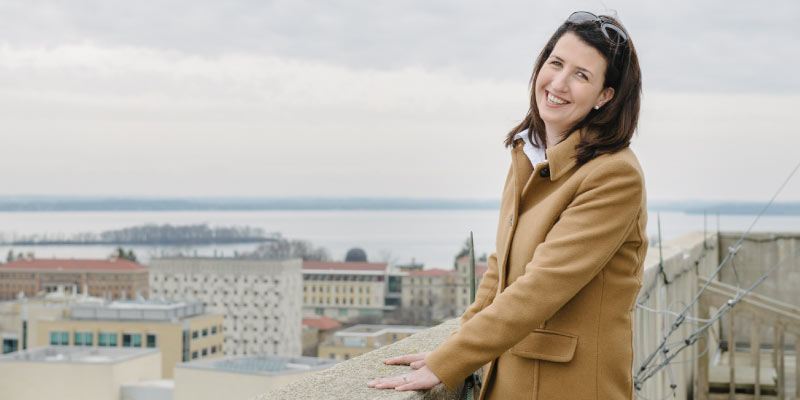 As a climate scientist and the mother of two boys, Tracey Holloway has a lot of reasons to care about the future of the planet.
As a climate scientist and the mother of two boys, Tracey Holloway has a lot of reasons to care about the future of the planet.
In her role as the Gaylord Nelson Distinguished Professor of Environmental Studies & Atmospheric and Oceanic Sciences, Holloway teaches classes, leads research activities, and speaks publicly on the links between climate change, energy, and air quality. She has witnessed the power that outreach and increased public understanding can have on moving environmental solutions forward, and she wants to be part of the solution on climate change.
Solving problems is also something Holloway does in her role as a mother. Like parents everywhere, she works to take care of her kids, prepares them for the future, and thinks about the world they are inheriting. That’s why she is teaming up with Science Moms to provide moms with the resources they need to need to take action on climate change.
Launched in partnership with the Potential Energy Coalition, Science Moms is a nonpartisan group of eight climate scientists and mothers, including Holloway, who are working together to share climate change information and educational resources with moms.
“I’m excited to be a part of this effort because it highlights the parts of science that everyone can relate to, including how it impacts our families and the future,” Holloway said.
Holloway shared that the program is aimed at providing resources for moms who want to learn more about climate change, talk with their friends and family about it, and perhaps even get involved in forwarding climate change solutions. Educational materials range from social media posts and short summaries of climate science, to humorous videos, to recommendations on climate science books for kids. “Our mission is to reach moms as they are powerful voices in our society and we want to empower them with the knowledge and the community they need to take action,” Holloway said. “This is a nonpartisan organization and we are not advocating for any one specific outcome, but we just want to give parents the information they need to have a voice on this matter.” As a part of Science Moms, Holloway volunteers her time and expertise, including serving as a spokesperson and advising on content.
As a mother to sons Peter (11) and Henry (1), Holloway shared that she can relate to the challenge of learning about new topics while juggling the day-to-day demands of parenthood and career. “I have to say that as a mom, reading books to my kids has been a huge way that I have learned about new topics – just ask me about dinosaurs! So, providing a list of kid’s books that deal with climate change – like the Magic School Bus –offers a great way to engage moms on this complex topic. Rather than adding homework to a mom’s to-do list, we try to offer options she can choose from.”
A busy mom herself, Holloway is not only a volunteer with the Science Moms program, but she is also involved in several other research and outreach related projects. For example, Holloway is the Team Lead for the NASA Health and Air Quality Applied Sciences Team (HAQAST), which is made up of 14 lab groups and over 70 researchers across the U.S. The team uses NASA satellite data to improve understanding of air quality and public health. Holloway is also a leader in the Energy Analysis and Policy (EAP) graduate certificate program in the Nelson Institute, helping graduate students from across the university link their training with energy and climate challenges.
“It’s been exciting for me to build a research program at the Nelson Institute, since there is a culture here that really supports outreach and engagement, as well as the interdisciplinary approaches needed to solve real-world challenges.”
Holloway hopes her work with Science Moms can help people to see that there are solutions and reasons to be positive about the future of the planet.
“We have so many energy solutions on the shelf, ready to go. There are cost-effective solutions that will help us move away from fossil-fuel burning, toward cleaner energy, and these things are often win-win for the economy, public health, and our day-to-day lives. It’s tempting to say that this is a big problem for the next generation, but I don’t think that’s fair. We can take action now, rather than leaving climate as a problem for our kids to fix.”